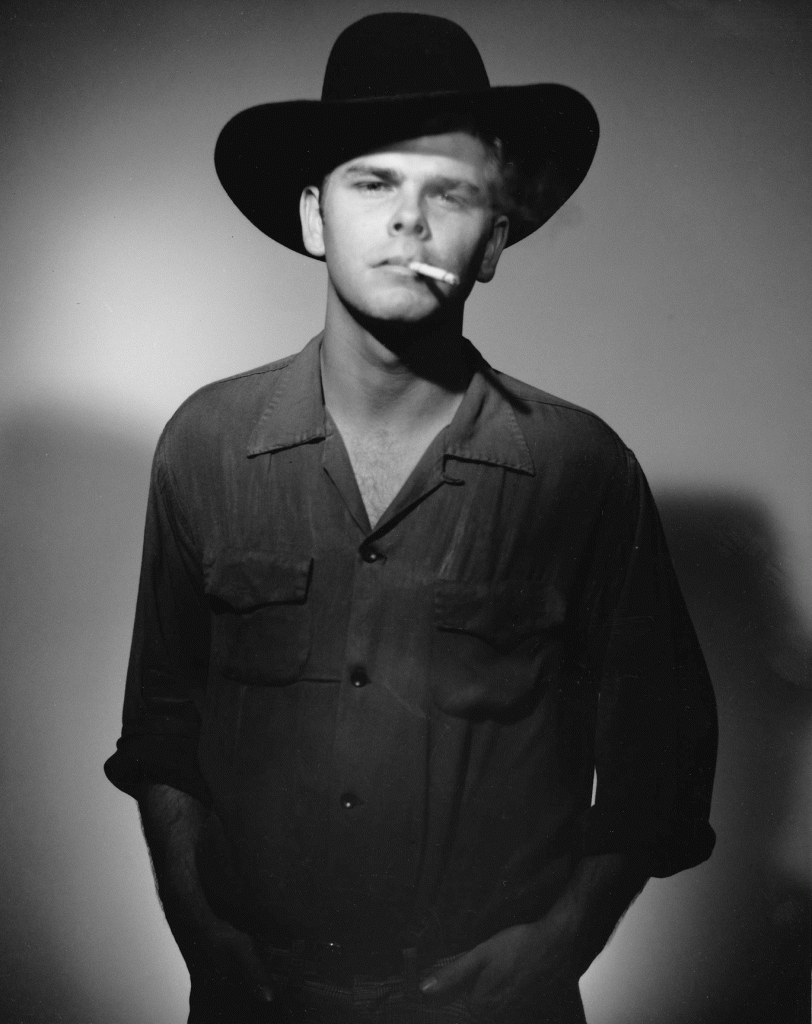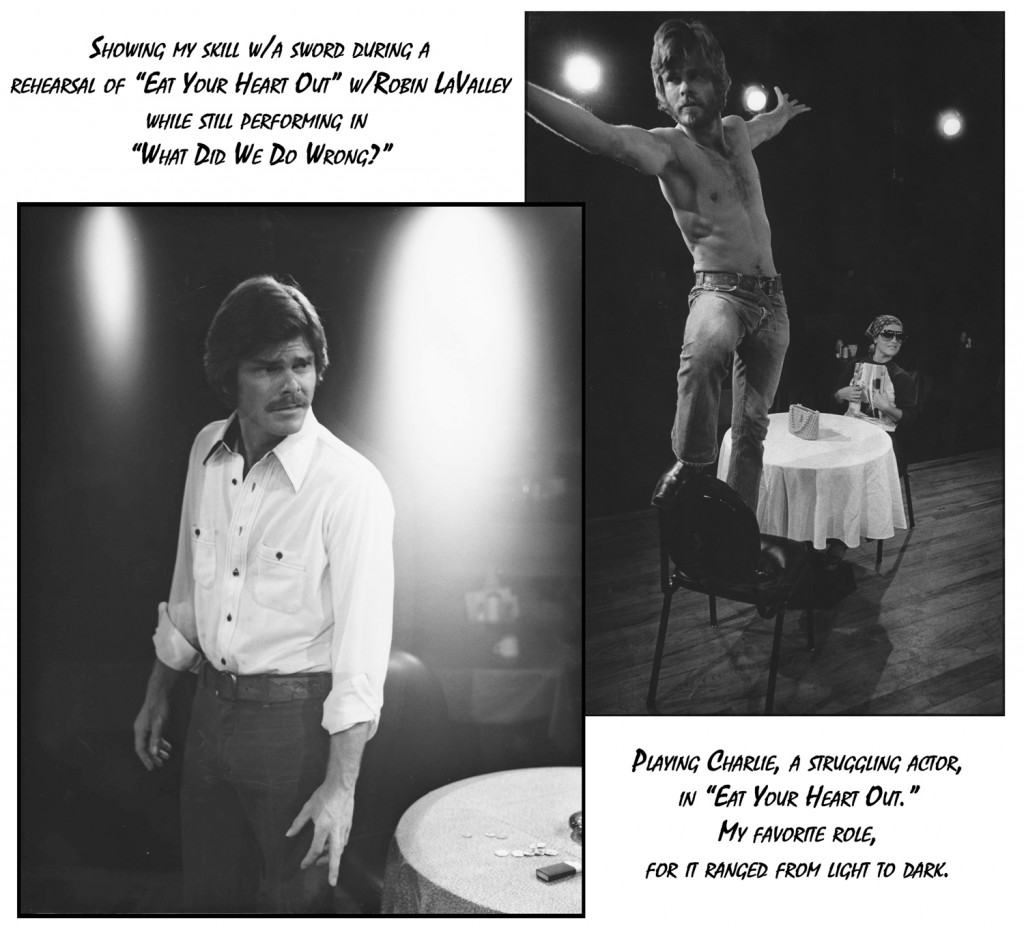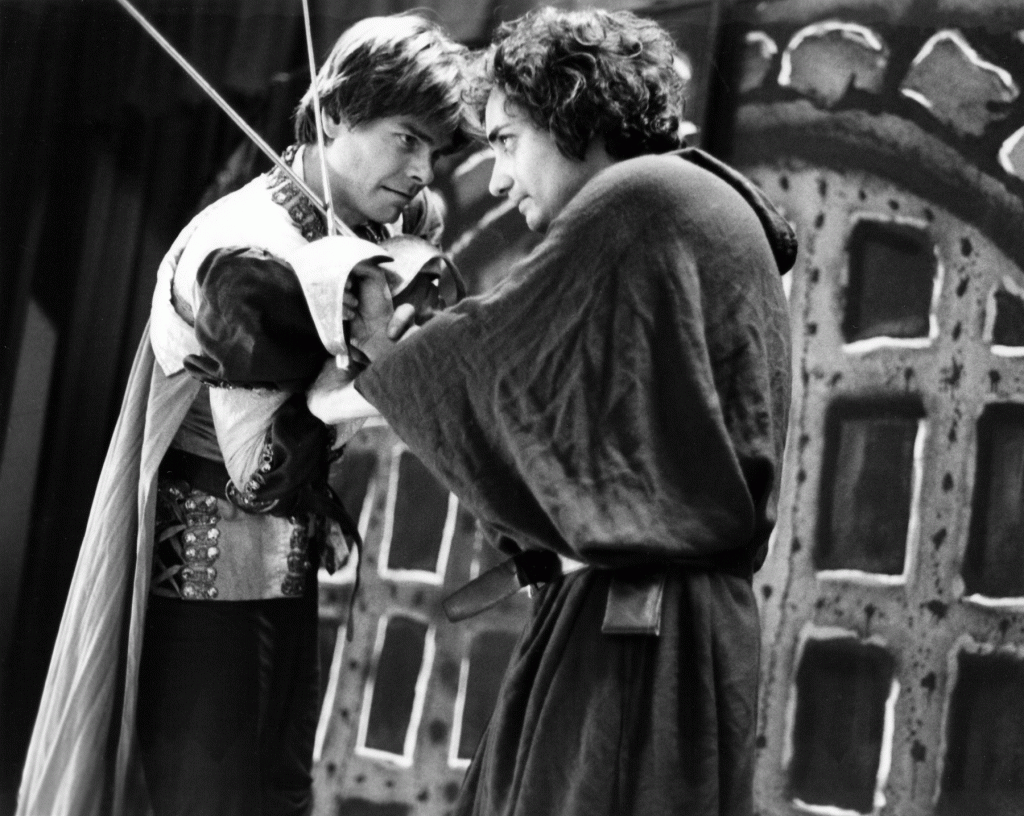For my senior year in college, where I was a theatre major, the department added extension classes wherein I was able to become a member of a professional theater in Los Angeles. I got lucky and first drew Theatre East followed by Theatre West. I don’t know if these theaters still exist but they were a cool training ground for I was hanging out with and working with the likes of Vic Tayback (while he prepared to play Tevye in Fiddler on the Roof), Carroll O’Connor (on a play he wrote, was acting in and directing—never got beyond initial rehearsals as he was cast in a film), and Tom Skerritt (also a play he wrote, was acting in and directing, but which also died when he was cast in the film MASH).

This image was taken by good friend Dennis Riley, who had learned his craft in the Navy. It was from my first publicity photo shoot, and was taken at the time I played Billy the Kid at Theater West. Another good friend, Dale Schuler, had a holster and Colt that he loaned me for the performance. Playing a westerner w/o a gun is in line with performing naked—I needed the Colt. (Photo © Louis Kraft 1969)
With the end of my college days arriving and the end of my time at Theatre West now in sight I wrote a one-act play for one of my required performances. O’Connor and Skerritt had—why not me? I came up with a story that dealt with Billy the Kid and his supposed meeting with Governor Lew Wallace of New Mexico Territory (oh yeah, I was linked to the frontier way back then). Charles Aidman, another well-known actor from that period, directed it. I played Billy (but can’t remember the other actor’s name). The comments were kind and constructive, but It was probably awful (both the writing and acting).
With the end of college I concentrated upon becoming a working actor. Luckily I had studied under Jeff Corey, the solid character actor who was only then recovering from the Communist witch hunt that terrorized the film industry in the late 1940s and 1950s, and Robert Ellenstein, a talented actor-director who played a role in Errol Flynn’s Too Much, Too Soon. Bob became a great friend and mentor for a number years after graduation (On a side note, I’ve always heard of what hell college was—not for me. I graduated in four years with something like 16-18 extra units, and I probably shouldn’t say this, but I will—it was one long party in which I had a hell of a lot of fun). Like I said, Bob took me under his wing, I became a frequent visitor to his home, and over the next several years attempted to improve my acting skills under his keen eye and constructive criticism. At one point he said to me: “Whatever you do in this life, make sure you can live with it.” I’ve never forgotten his words, and regardless of how much trouble I’ve caused myself over the years I’ve never done anything I couldn’t live with. Actually, as I was writing the Wynkoop book I realized that Bob’s words summarized Ned and his actions while working with Indians. This stuck with me through many drafts, and when nearing completion, I added Bob’s quote to the Wynkoop manuscript.
An actor’s life for me. Don’t hold your breath!!! Having talent has nothing to do with being successful. Both good actors and bad actors succeed. That’s a jaundiced view, and I’ve got nothing more to say about it—except if your daughter or son wants to become an actor, do whatever you can to talk them out of it. … Like I said, an actor’s life for me. I totally forgot about writing. By the way, I never took a creative writing class in school. In college I took one history class in my first semester. The hour ended and I didn’t have a clue what this professor was talking about (and he was speaking in English). He then said that the students didn’t have to attend another class—other than the midterm and the final. Show up for them and turn in an acceptable term paper and you’ll pass. I took him at his word and passed (I should say that the experience was so bad that I never took another history class in my life—not quite true, for there were many in the Theater Department and I aced them).
 The year 1976 arrived and I landed a lead in a generation-gap comedy (What Did We Do Wrong?) and spent that summer performing dinner theater in Lubbock, Texas. While in Texas I played Charlie in Eat Your Heart Out, a dark comedy that dealt with an actor who struggled to survive while waiting tables (a part I liked so much that I performed it again in California). The other lead actors (and director) came from Los Angeles. All claimed to be writers, which only proves that writers, like actors, are a dime a dozen in LA. I’m being derogatory here but I shouldn’t be—actors, writers, artists, dancers, and all other creative people are free spirits that bring joy to this world with their brains, their open-hearts, and their creativity. They have passion for what drives them, and it isn’t always riches and stardom. Every time I’m in their presence I’m alive. My friends—bless you. … Well that summer of 1976 mimicked 1970 (another year wherein I earned money in Texas), and to be serious I was thrilled to get out without being tarred and feathered. I was a star in a wading pool (as opposed to being a small fish in an ocean) and some of the locals weren’t thrilled with me (an understatement). After returning home I wrote a screenplay about getting out of the Lone Star state alive and submitted it to a literary agent. The agent called and said, “This is awful, but let’s talk.”
The year 1976 arrived and I landed a lead in a generation-gap comedy (What Did We Do Wrong?) and spent that summer performing dinner theater in Lubbock, Texas. While in Texas I played Charlie in Eat Your Heart Out, a dark comedy that dealt with an actor who struggled to survive while waiting tables (a part I liked so much that I performed it again in California). The other lead actors (and director) came from Los Angeles. All claimed to be writers, which only proves that writers, like actors, are a dime a dozen in LA. I’m being derogatory here but I shouldn’t be—actors, writers, artists, dancers, and all other creative people are free spirits that bring joy to this world with their brains, their open-hearts, and their creativity. They have passion for what drives them, and it isn’t always riches and stardom. Every time I’m in their presence I’m alive. My friends—bless you. … Well that summer of 1976 mimicked 1970 (another year wherein I earned money in Texas), and to be serious I was thrilled to get out without being tarred and feathered. I was a star in a wading pool (as opposed to being a small fish in an ocean) and some of the locals weren’t thrilled with me (an understatement). After returning home I wrote a screenplay about getting out of the Lone Star state alive and submitted it to a literary agent. The agent called and said, “This is awful, but let’s talk.”

lk and Jeff Richards during the Northern California tour of The Prince and the Pauper in 1982. (Photo © Louis Kraft 1982)
That call to the agent began a student-coach relationship that lasted into the next decade. During that time I wrote over a dozen scripts that received ongoing reviews. A few of them came close to being optioned or sold. Rory Calhoun (who was at the end of his career} almost bought a script that dealt with the end of the world as we know it and the return to survival of the fittest. Richard Thomas liked a number of them; his favorite being the one that Calhoun didn’t buy, but Richard couldn’t raise the money. Scriptwriter/producer Bob Sabaroff (of Then Came Bronson fame) liked a screenplay that dealt with the destruction of Germany as seen through the eyes of a U-boat commander and a Jewish woman during World War II. Sabaroff told me to rewrite it as a World War I epic and remove the racism. Realizing that he wanted to remove what the story was about, I refused. Even though a number of scripts came close to sales or options, none sold.
Being a writer with no sales was getting old. Let me repeat that—OLD!
During the early 1980s while playing the “swashbuckling” Miles Hendon in a touring production of The Prince and the Pauper (135 performances), I came up with the idea of a one-act comic battle of the sexes brought to life with crossed swords. The Fencing Lesson premiered in North Hollywood, California, in 1982, and of course the female character lost in the dueling but then proceeded to beat the hell out of me with her fists. Sexual, action packed, and played lightly, the audience loved it,
The end of my theatrical writing career had arrived without really starting, and the acting career wasn’t far behind. … But the writing hadn’t ended, it had just begun. As for acting, all my acting friends said I’d be back. “No,” I said, “never.”
| Louis Kraft writer © Louis Kraft 2013–2024 |
